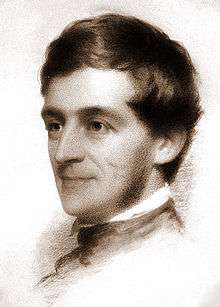Self-Reliance

"Self-Reliance" is an 1841 essay written by American transcendentalist philosopher and essayist Ralph Waldo Emerson. It contains the most thorough statement of one of Emerson's recurrent themes: the need for each individual to avoid conformity and false consistency, and follow their own instincts and ideas. It is the source of one of Emerson's most famous quotations: "A foolish consistency is the hobgoblin of little minds, adored by little statesmen and philosophers and divines."[1] This essay is an analysis into the nature of the “aboriginal self on which a universal reliance may be grounded.”[2]
History
The first hint of the philosophy that would become "Self-Reliance" was presented by Ralph Waldo Emerson as part of a sermon in September 1830 a month after his first marriage.[3] His wife Ellen was sick with tuberculosis[4] and, as Emerson's biographer Robert D. Richardson wrote, "Immortality had never been stronger or more desperately needed!"[3]
From 1836 into 1837, Emerson presented a series of lectures on the philosophy of history at Boston's Masonic Temple. These lectures were never published separately, but many of his thoughts in these were later used in "Self-Reliance" and several other essays.[5] Later lectures by Emerson led to public censure of his radical views, the staunch defense of individualism in "Self-Reliance" being a possible reaction to that censure.[6]
"Self-Reliance" was first published in his 1841 collection, Essays: First Series.[7] Emerson helped start the beginning of the Transcendentalist movement in America. "Self-Reliance" is one of Emerson’s most famous essays. Emerson wrote on “individualism, personal responsibility, and nonconformity.”[8]
The Transcendentalist movement flourished in New England, and proposed a revolutionarily new philosophy of life. This new philosophy drew upon old ideas of Romanticism, Unitarianism, and German Idealism. Some of these ideas pertained closely to the values of America at the time. These values included nature, individualism, and reform, and can be noted in Emerson's essay.
Themes
- Individual authority: Emerson mentions that citizens control the government so they have control. He also mentions how “nothing has authority over the self.” He says, “History cannot bring enlightenment; only individual searching can.” He believes that truth is inside a person and this is an authority, not institutions like religion.[8]
- Nonconformity: Emerson states, "Whoso would be a man must be a nonconformist." He counsels his readers to do what they think is right no matter what others think.[8]
- Solitude and the community: Emerson wrote how the community is a distraction to self-growth, by friendly visits, and family needs. He advocates more time being spent reflecting on one’s self. This can also happen in the community through a strong self-confidence. This would help the counseled to not sway from his beliefs in groups of people.[8]
- Spirituality: Truth is within one’s self. Emerson posits that reliance upon institutionalized religion hinders the ability to grow mentally as an individual.[8]
Criticism
Herman Melville's Moby-Dick has been read as a critique of Emerson's philosophy of self-reliance, embodied particularly in the life and death of Ahab. Melville's critique of self-reliance as a way of life is seen to lie in its destructive potential, especially when taken to extremes. Richard Chase writes that for Melville, 'Death–spiritual, emotional, physical–is the price of self-reliance when it is pushed to the point of solipsism, where the world has no existence apart from the all-sufficient self.'[9]In that regard, Chase sees Melville's art as antithetical to that of Emerson's thought, in that Melville '[points] up the dangers of an exaggerated self-regard, rather than, as [...] Emerson loved to do, [suggested] the vital possibilities of the self.'[9]Newton Arvin further suggests that self-reliance was, for Melville, really the '[masquerade in kingly weeds of] a wild egoism, anarchic, irresponsible, and destructive.'[10]
In popular culture
Emerson's quote, "A foolish consistency is the hobgoblin of little minds," is a running joke in the 1998 film Next Stop Wonderland. A single woman (portrayed by Hope Davis), who is familiar with the Emerson quote, goes on dates with several men, each of whom tries to impress her by referencing the line, but misquotes it and misattributes it to W.C. Fields, Karl Marx, or Cicero.[11] The woman finally meets a man (portrayed by Alan Gelfant) who correctly attributes the quote to Emerson.
References
- ↑ Ralph Waldo Emerson (1803–1882) Bartleby.com, Inc., 1841.
- ↑ Baldwin, Neil (2005). The American Revelation. New York: St. Martin's Press. pp. 61–78.
- 1 2 Richardson, Robert D. Jr. Emerson: The Mind on Fire. Berkeley, California: University of California Press, 1995: 99. ISBN 0-520-08808-5.
- ↑ McAleer, John. Ralph Waldo Emerson: Days of Encounter. Boston: Little, Brown and Company, 1984: 105. ISBN 0-316-55341-7.
- ↑ Richardson, Robert D. Jr. Emerson: The Mind on Fire. Berkeley, California: University of California Press, 1995: 257. ISBN 0-520-08808-5
- ↑ Richardson, Robert D. Jr. Emerson: The Mind on Fire. Berkeley, California: University of California Press, 1995: 300. ISBN 0-520-08808-5.
- ↑ Myerson, Joel (2000). Transcendentalism: A Reader. New York: Oxford University Press. pp. 318–339.
- 1 2 3 4 5 Hacht, Anne, ed. (2007). "Major Works" Literary Themes for Students: The American Dream. Detroit: Gale. pp. 453–466. Retrieved November 25, 2014.
- 1 2 Chase, Richard, ed. (1962). "Melville and Moby-Dick". Melville: a Collection of Critical Essays. Spectrum. pp. 56–61.
- ↑ Melville, Herman (1981). Arvin, Newton, ed. Moby-Dick. Bantam. pp. 549–558. ISBN 0-553-21311-3.
- ↑ O'Sullivan, Michael (August 28, 1998). "'Next Stop Wonderland'". The Washington Post.
Bibliography
Editions
- Emerson, Ralph Waldo Selected Essays (Harmondsworth: Penguin American Library, 1982) ISBN 0140390138. Edited with an introduction by Larzer Ziff. pp. 175-203.
Criticism
- Porte, Joel and Saundra Morris (eds.) The Cambridge Companion to Ralph Waldo Emerson (Cambridge: Cambridge University Press, 1999) ISBN 052149611X. See especially pp. 13-30 and pp. 106-111.
External links
| Wikisource has original text related to this article: |
- Text of Ralph Waldo Emerson's essay, "Self-Reliance"
- "Out of Panic, 'Self-Reliance'" by Harold Bloom, New York Times, October 12, 2008

